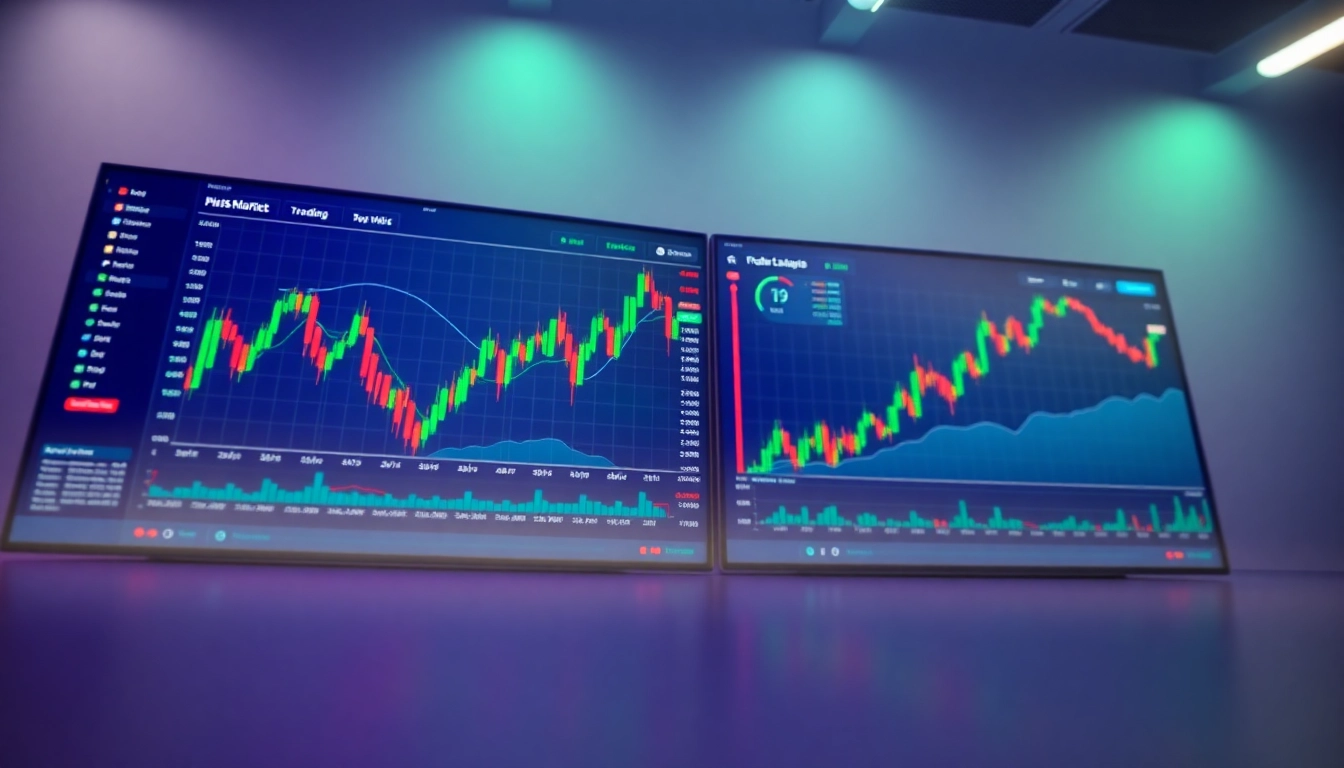Understanding the Basics of Online Stock Trading in the UK
Online stock trading in the UK has revolutionized the way individuals and institutional investors partake in the financial markets. With technological advancements and regulatory frameworks in place, investors now have unprecedented access to a diverse array of assets—from UK equities to international stocks—directly from their computers or mobile devices. If you’re looking to navigate this dynamic landscape confidently, it’s essential first to understand what online stock trading entails and how it functions within the UK’s financial environment. For newcomers eager to start, exploring the different platforms and strategies with a clear understanding of the regulatory landscape can be immensely beneficial.
To leverage effective trading tools, consider exploring resources and platforms such as Online Stock Trading UK, which offer comprehensive guidance tailored specifically for the UK market. These platforms provide user-friendly interfaces, educational resources, and access to trading instruments that cater to both beginners and seasoned traders.
What is online stock trading and how does it work?
Online stock trading involves buying and selling shares, ETFs, options, or other financial instruments through electronic platforms provided by brokerage firms. Unlike traditional trading via a physical broker or stock exchange floor, online trading offers significantly lower costs, faster execution, and greater control over investment decisions.
In practice, investors open accounts with online brokers, fund them via bank transfers, and execute trade orders through trading platforms. These platforms connect to exchanges such as the London Stock Exchange (LSE) or international markets, enabling real-time market data and order execution. Orders can be placed as market orders, which execute immediately at current prices, or as limit/order orders, which execute once certain price conditions are met.
For those just starting, understanding how to interpret stock quotes, candlestick charts, and order types is fundamental. The process involves analyzing market data, forming a strategy, and executing trades that align with your risk tolerance and investment goals.
Key regulations and legal considerations in the UK market
The UK’s financial markets operate under rigorous regulatory oversight to ensure transparency, fairness, and investor protection. The Financial Conduct Authority (FCA) is the principal regulator overseeing trading activities, licensing brokers, and enforcing compliance standards.
Before trading, investors should verify that their chosen platform is FCA-registered, ensuring adherence to strict standards regarding client funds segregation, risk disclosures, and anti-money laundering measures. Additionally, UK traders need to understand tax obligations, such as Capital Gains Tax (CGT) on profits, and consider accounts like ISAs or S&S ISAs, which provide tax-efficient investment options.
The Markets in Financial Instruments Directive II (MiFID II) further enhances transparency and investor rights within the EU-UK landscape, mandating clear disclosure and best execution practices that protect retail traders.
Essential terminology every trader should know
- Brokerage Account: An account opened with a licensed broker allowing trading activities.
- Spread: The difference between the bid and ask price of a stock.
- Market Order: An order to buy or sell immediately at the best available price.
- Limit Order: An order to buy or sell only when the price reaches a specified level.
- Leverage: Borrowed funds used to increase trading position size.
- Margin: The collateral required to open leveraged positions.
- Stop-Loss: An order to limit potential losses by closing a position at a predetermined price.
- Dividend: A portion of company profits paid to shareholders.
- ETF (Exchange-Traded Fund): A basket of securities traded on stock exchanges, offering diversification.
Mastering these terms helps traders communicate effectively, understand market dynamics, and execute strategies more efficiently.
Selecting the Best UK Trading Platforms for Your Needs
Comparison of top UK trading platforms in 2025
Choosing the right trading platform is critical for executing successful trades. Popular platforms in the UK include:
- Interactive Brokers: Known for its comprehensive global access, advanced trading tools, and competitive fees, it suits active traders and institutional investors.
- Trading 212: Favored for its user-friendly interface, commission-free trading, and suitability for beginners.
- Freetrade: Offers zero-commission trades on UK and US stocks with a simple mobile app for casual investors.
- Degiro: A low-cost European broker with extensive markets and low trading commissions, ideal for cost-conscious investors.
Each platform has unique strengths; your choice should depend on your trading style, experience level, and investment preferences. For instance, active traders evaluating multiple markets might prefer Interactive Brokers, whereas casual investors might find Freetrade or Trading 212 more accessible.
Features to consider: fees, user interface, available markets
- Fees: Look beyond trading commissions—consider deposit/withdrawal fees, currency conversion costs, and inactivity charges.
- User Interface: An intuitive and customizable interface enhances trading efficiency, especially for day traders requiring quick execution.
- Available Markets: Ensure the platform offers access to the UK’s main exchanges like the LSE, as well as international markets if necessary.
- Research & Tools: Integration of analytical tools, news feeds, and educational resources can aid strategic decision-making.
- Mobile Trading Capabilities: With the rise of mobile trading apps, seamless and reliable mobile access is essential for on-the-go trading.
How to open and set up an effective trading account
To open a trading account, you’ll typically need identification documents, proof of address, and potentially financial information to ensure compliance with anti-money laundering regulations. After registration:
- Complete your profile, including risk tolerance and investment goals.
- Deposit funds via bank transfer or other supported methods.
- Familiarize yourself with the platform’s features, tools, and order types through demo accounts or tutorials.
- Set up security features such as two-factor authentication to safeguard your account.
Regularly review your account settings, update your security preferences, and leverage educational resources offered by platforms to build confidence and competence in your trading approach.
Developing a Proven Trading Strategy for the UK Market
Fundamental analysis vs. technical analysis for UK stocks
Choosing between fundamental and technical analysis depends on your trading style and objectives. Fundamental analysis involves assessing a company’s financial health, earnings, market position, and macroeconomic factors influencing UK stocks. It is suited for long-term investors seeking value-based investments.
Technical analysis, on the other hand, examines price charts, volume trends, and technical indicators to forecast short-term price movements. Day traders and swing traders often rely heavily on technical signals to identify entry and exit points.
Many successful traders combine both approaches to validate signals and improve decision accuracy.
Risk management and setting realistic profit targets
Effective risk management involves defining position sizes, setting stop-loss orders, and maintaining a disciplined approach to avoid emotional trading. For instance, risking only 1-2% of your trading capital per trade helps manage potential losses.
Setting realistic profit targets aligned with market conditions and your risk-reward ratio prevents overambition and supports consistent performance. Use trading journals to record outcomes, learn from mistakes, and refine your approach over time.
Leveraging demo accounts to hone your skills
Most platforms provide free demo accounts mimicking live trading conditions. These allow beginners to practice without risking real money, mastering order types, understanding market behavior, and testing strategies. Use demo accounts rigorously before transitioning to live trading to build confidence and reduce mistakes.
Advanced Techniques and Tools for Online Trading Success
Utilizing trading algorithms and automation
Automated trading systems and algorithms enable traders to execute pre-defined strategies swiftly and objectively, removing emotional biases. Tools like TradingView or MetaTrader support algorithmic trading, allowing for backtesting and optimization of strategies tailored for UK markets.
Consider developing or adopting trading bots that can analyze multiple data sources, enter, and exit trades based on technical signals, economic announcements, or custom indicators. Properly tested automation can improve efficiency and profitability.
Monitoring market news and economic indicators in the UK
Staying updated with economic releases, political developments, and macroeconomic data releases—such as GDP growth, inflation, interest rates, and Brexit-related news—is vital in the UK context. Use real-time news feeds, economic calendars, and government reports to anticipate market movements and adjust your trading plans accordingly.
Integrating mobile trading apps for on-the-go decisions
Modern trading platforms provide powerful mobile apps that enable execution of trades, monitoring of positions, and accessing research from anywhere. Ensure your chosen app offers reliable notifications and quick execution speeds, particularly if you are engaged in active trading or need to respond rapidly to market shifts.
Measuring Performance and Continuous Improvement
Tracking your trading performance and key metrics
Use trading journals and analytics tools to record every trade, noting entry/exit points, position sizes, and outcome. Key metrics such as win rate, average profit/loss, risk-reward ratio, and drawdowns help evaluate your effectiveness and identify areas for enhancement.
Adapting strategies based on market trends
The UK market is influenced by geopolitical events, monetary policy, currency fluctuations, and international economic conditions. Regularly review your strategies against changing market dynamics, and adjust your approach accordingly. Employing technical analysis tools like moving averages, Bollinger Bands, or RSI can help recognize evolving trends.
Resources for ongoing education and staying updated
Stay competitive by engaging with reputable sources—financial news outlets, analytical reports, webinars, and courses. Platforms like the London Stock Exchange and industry experts provide valuable insights. Joining online trading communities and forums can also expand your knowledge and expose you to diverse perspectives.







